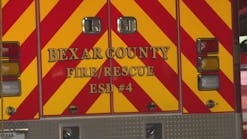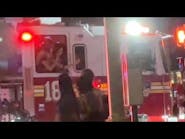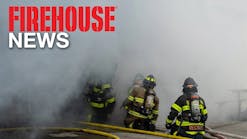In announcing the decision of the board, attorney John Broihier said. "It is the decision of the board after reviewing all of the evidence presented, that the complainant (the city and the Fire Department) has not met the burden of proof and the board is granting the motion of the defense to dismiss the charges."
In the charges, Stewart was accused of deliberately refusing to obey orders, neglecting duty and insubordination. The city and Fire Department asked that Stewart be terminated or if that request were not allowed, to be suspended without pay for not less than 30 days. The complaint further asked that he not be allowed to use any leave time accumulated to compensate for the suspension.
Broihier came down from Naperville to represent the board in the hearing. Stewart was represented by Don Craven of Springfield and the city and the Fire Department were represented by Danielle LaChance-Yates of the Kasten Gerber law firm in Edwardsville. David Gerber, the city's attorney, was also present.
The charges against Stewart, 47, a member of the department for 20 years, stemmed from a busy day in December when several firefighters were called in to stand by while all three ambulances and their crews were responding to calls.
Stewart, Capt. Don Ladd, now retired, and Capt. Jim Anderson, now the acting fire chief, were among those called in to stand by.
It was also a day when all on-duty firefighters were in training at Fire Station 1.
Stewart and Ladd were told to stand by at Fire Station 2. Conflicting testimony was presented at the hearing, making it unclear whether standby firefighters should be released in the order they were called in or at the return of the ambulance and crew they stood by for.
Former Chief Mike Karlechik said it is department policy when firefighters are called in, the first ones called are typically the first ones to be released from duty. However, he said the situation that day was atypical.
Stewart and Ladd, the first ones called in to stand by, and the only ones at Station 2, were not sure whether they should leave after an ambulance returned and was again available for service, so Stewart called Fire Station 1 to find out.
According to testimony presented at the hearing, both sides agreed that Stewart called after the first ambulance returned and before the second one returned; the disagreement was about what he was told when he called.
According to Stewart, he was told by Anderson that Anderson wasn't certain whether he and Ladd should be free to go, but that Anderson would check and call back. This was borne out in the formal complaint. But, Anderson said he ordered Stewart to remain at Fire Station 2.
They did so until the second ambulance returned to the station and was available for service and then Stewart and Anderson assumed they were free to go and did so.
Stewart's attorney, Don Craven of Springfield, asked Stewart if he would have stayed at Station 2 if he had been ordered to do so. Stewart said yes.
"Did you receive such an order?" Craven said. Stewart said no.
In questioning Anderson, Craven asked him if he was one of the last standbys to arrive. Anderson said he was. He said when the ambulance arrived that he was to stand by for, he was released, but was told to call Stewart and advise him that they were not released. When he called, Fire Station 2, he was surprised that no one was there.
"I anticipated I would have four people on duty, not knowing that Station 2 was empty and there would not have been a response from that station," Anderson said. "If I was unaware it was empty and there would be no response to an ambulance call, it would be quite serious."
"But, Station 2 was unmanned anyway, wasn't it?" Craven said. "Everyone was at Station 1 for training?"
Anderson said when firefighters were at Station 1 for training, they were still on duty and would respond if an emergency medical call came.
"If the former chief is right and firefighters are released in the order called in, you and the other firefighter would have still been on the clock?" Craven said.
Anderson said firefighters are released in the order of the ambulance called for and should stand by until that ambulance returns and is available for service again.
"Then the language in the complaint is wrong?" Craven said. "Is the language confusing or is it possible that there is confusion in the Edwardsville Fire Department about procedure?"
"I'm not confused," Anderson said.
In his testimony, Ladd said, "If the ambulances are at Station 1 and you're at Station 2, you don't know which one goes out first, only the (guys) at Station 1 know that." He said he did not know which ambulance he was called out for.
In closing, Craven said, "The city has the burden of proving that Mr. Stewart was given a direct order and disobeyed it. Testimony provides no such proof."
LaChance-Yates said there was testimony that a direct order was given.
After the decision to dismiss the charges was announced, Craven said, "We're ecstatic. I thought all along the evidence was clear. There was confusion about whether they were relieved when the first ambulance came in, but they did the right thing and called Capt. Anderson."
No one from the Fire Department would comment on the outcome, including Stewart, who would only say, "I've learned to keep my mouth shut."





